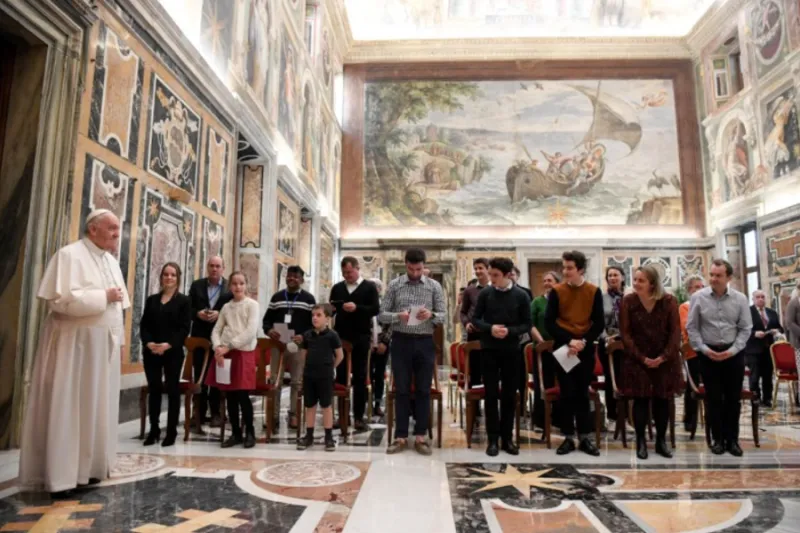
Vatican City, Feb 17, 2022 / 09:00 am (CNA).
Pope Francis said Thursday that the world needs beauty more than ever, as beauty can awaken a thirst for God.
“Beauty can touch in everyone what is universal – especially the thirst for God – crossing the limits of language and culture,” Pope Francis said on Feb. 17.
“An authentic artist is able to speak about God better than anyone else, to make people perceive His beauty and goodness, to ‘reach the human heart and make the truth and goodness of the Risen Lord shine in it.’”
The pope met with a French Catholic group, Diaconie de la beauté (Diakonia of Beauty), which is dedicated to supporting artists and celebrating sacred art, architecture, poetry, and music.
“In the difficult current context that the world is experiencing, in which sadness and distress sometimes seem to have the upper hand, your mission is more necessary than ever, because beauty is always a source of joy, putting us in touch with divine goodness,” the pope said.
“If there is beauty, it is because God is good and he gives it to us. And this gives us joy, reassures us, does us good. Contact with beauty lifts us up, always, beauty makes us look beyond. By inspiring and sustaining faith, it is a way to go to the Lord.”
Diakonia of Beauty is celebrating the 10th anniversary of its founding this year. The organization hosts “Festivals of Beauty” in five cities across France. The multi-disciplinary festivals include concerts, theater performances, art exhibitions, and Masses for artists.
“I thank you for the work you do, for the joy you give to the world with your works, and I encourage you, once again, to continue your service with love and competence, because the world needs beauty more than ever,” Pope Francis said.
The pope met the group in the Clementine Hall of the Apostolic Palace – a room with walls completely covered with Renaissance frescoes.
He invited the delegation to carefully reread Saint John Paul II’s Letter to Artists.
“‘In order to communicate the message entrusted to her by Christ, the Church needs art,’” Pope Francis said, quoting the letter.
“‘Art must make perceptible, and as far as possible attractive, the world of the spirit, of the invisible, of God. It must therefore translate into meaningful terms that which is in itself ineffable. Art has a unique capacity to take one or other facet of the message and translate it into colors, shapes and sounds which nourish the intuition of those who look or listen.’”
Pope Francis thanked the artists present in the audience for helping people today to take “the via pulchritudinis,” or “way of beauty” toward an encounter with God.
“The Holy Scriptures speak to us a lot about the beauty of the universe and all that it contains, and which refers by analogy to that of the Creator. They also remind us that each of us is called by nature to be an artisan and a guardian of that beauty,” he said.
“Artistic work completes, in a sense, the beauty of creation and, when it is inspired by faith, reveals more clearly to people the divine love that is at its origin.”
“May the Virgin Mary lead you more and more into the mystery of God, and may the Holy Spirit inspire you; don’t forget to invoke Him,” Pope Francis said.
If you value the news and views Catholic World Report provides, please consider donating to support our efforts. Your contribution will help us continue to make CWR available to all readers worldwide for free, without a subscription. Thank you for your generosity!
Click here for more information on donating to CWR. Click here to sign up for our newsletter.





Leave a Reply